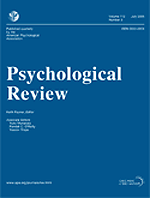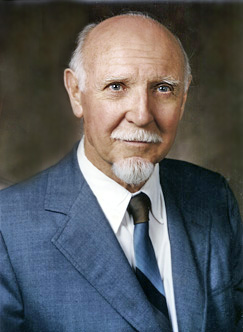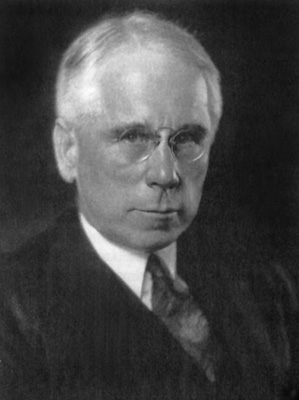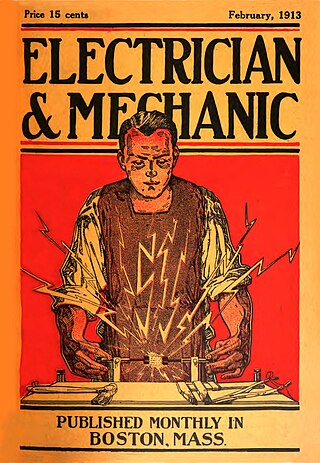Related Research Articles

James Mark Baldwin was an American philosopher and psychologist who was educated at Princeton under the supervision of Scottish philosopher James McCosh and who was one of the founders of the Department of Psychology at Princeton and the University of Toronto. He made important contributions to early psychology, psychiatry, and to the theory of evolution.
The American Naturalist is the monthly peer-reviewed scientific journal of the American Society of Naturalists, whose purpose is "to advance and to diffuse knowledge of organic evolution and other broad biological principles so as to enhance the conceptual unification of the biological sciences." It was established in 1867 and is published by the University of Chicago Press. The journal covers research in ecology, evolutionary biology, population, and integrative biology. As of 2018, the editor-in-chief is Daniel I. Bolnick. According to the Journal Citation Reports, the journal had a 2020 impact factor of 3.926.

Science, also widely referred to as Science Magazine, is the peer-reviewed academic journal of the American Association for the Advancement of Science (AAAS) and one of the world's top academic journals. It was first published in 1880, is currently circulated weekly and has a subscriber base of around 130,000. Because institutional subscriptions and online access serve a larger audience, its estimated readership is over 400,000 people.

James McKeen Cattell, an American psychologist, was the first professor of psychology in the United States, teaching at the University of Pennsylvania, and a long-time editor and publisher of scientific journals and publications, including Science. He also served on the board of trustees for Science Service, now known as Society for Science & the Public (SSP) from 1921 to 1944.

Popular Science is an American digital magazine carrying popular science content, which refers to articles for the general reader on science and technology subjects. Popular Science has won over 58 awards, including the American Society of Magazine Editors awards for its journalistic excellence in 2003, 2004, and 2019. With roots beginning in 1872, Popular Science has been translated into over 30 languages and is distributed to at least 45 countries.
The Society for the Diffusion of Useful Knowledge (SDUK) was founded in London in 1826, mainly at the instigation of Whig MP Henry Brougham, with the object of publishing information to people who were unable to obtain formal teaching or who preferred self-education. It was a largely Whig organisation, and published inexpensive texts intended to adapt scientific and similarly high-minded material for the rapidly-expanding reading public over twenty years until it was disbanded in 1846.

Psychological Review is a bimonthly peer-reviewed academic journal that covers psychological theory. It was established by James Mark Baldwin and James McKeen Cattell in 1894 as a publication vehicle for psychologists not connected with the laboratory of G. Stanley Hall, who often published in his American Journal of Psychology. Psychological Review soon became the most prominent and influential psychology journal in North America, publishing important articles by William James, John Dewey, James Rowland Angell, and many others.

Raymond Bernard Cattell was a British-American psychologist, known for his psychometric research into intrapersonal psychological structure. His work also explored the basic dimensions of personality and temperament, the range of cognitive abilities, the dynamic dimensions of motivation and emotion, the clinical dimensions of abnormal personality, patterns of group syntality and social behavior, applications of personality research to psychotherapy and learning theory, predictors of creativity and achievement, and many multivariate research methods including the refinement of factor analytic methods for exploring and measuring these domains. Cattell authored, co-authored, or edited almost 60 scholarly books, more than 500 research articles, and over 30 standardized psychometric tests, questionnaires, and rating scales. According to a widely cited ranking, Cattell was the 16th most eminent, 7th most cited in the scientific journal literature, and among the most productive psychologists of the 20th century. He was a controversial figure due in part to his friendships with, and intellectual respect for, white supremacists and neo-Nazis.

Lewis Madison Terman was an American psychologist and author. He was noted as a pioneer in educational psychology in the early 20th century at the Stanford Graduate School of Education. He is best known for his revision of the Stanford–Binet Intelligence Scales and for initiating the longitudinal study of children with high IQs called the Genetic Studies of Genius. He was a prominent eugenicist and was a member of the Human Betterment Foundation. He also served as president of the American Psychological Association. A Review of General Psychology survey, published in 2002, ranked Terman as the 72nd most cited psychologist of the 20th century, in a tie with G. Stanley Hall.

Robert Sessions Woodworth was an American academic psychologist and the creator of the personality test which bears his name. A graduate of Harvard and Columbia, he studied under William James along with other prominent psychologists as Leta Stetter Hollingworth, James Rowland Angell, and Edward Thorndike. His textbook Psychology: A study of mental life, which appeared first in 1921, went through many editions and was the first introduction to psychology for generations of undergraduate students. His 1938 textbook of experimental psychology was scarcely less influential, especially in the 1954 second edition, written with Harold H. Schlosberg. He is known for introducing the Stimulus-Organism-Response (S-O-R) formula of behavior. A Review of General Psychology survey, published in 2002, ranked Woodworth as the 88th most cited psychologist of the 20th century, tied with John Garcia, James J. Gibson, David Rumelhart, Louis Leon Thurstone, and Margaret Floy Washburn.

Lightner Witmer was an American psychologist. He introduced the term "clinical psychology" and is often credited with founding the field that it describes. Witmer created the world's first "psychological clinic" at the University of Pennsylvania in 1896, including the first journal of clinical psychology and the first clinical hospital school in 1907.

Harry Levi Hollingworth was one of the first psychologists to bring psychology into the advertising world, as well as a pioneer in applied psychology.

Electrician and Mechanic was an American science and technology magazine published from 1890 to January 1914 when it merged with Modern Electrics to become Modern Electrics & Mechanics. In July 1914, incorporated with Popular Electricity and the World's Advance and the title became Popular Electricity and Modern Mechanics. The new publisher, Modern Publishing, began a series of magazine mergers and title changes so numerous that librarians began to complain. In October 1915 the title became Popular Science Monthly and the magazine is still published under that name today.
American Men and Women of Science is a biographical reference work on leading scientists in the United States and Canada, published as a series of books and online by Gale. The first edition was published in 1906, named American Men of Science; the work broadened its title to include women in 1971.
James Bass Mullinger, sometimes known by his pen name Theodorus, was a British author, historian, lecturer and scholar. A longtime university librarian and lecturer at St. John's College, Cambridge, Mullinger was the author of several books detailing the college's history and similar academic subjects. He was also a contributor to many periodicals of the Victorian era, most especially, Cambridge History of Modern Literature, the Dictionary of National Biography and Encyclopædia Britannica.
The following outline is provided as an overview of and topical guide to human intelligence:
Jaques (Jack) Cattell was an American publisher and founder of a company bearing his name, "Jaques Cattell Press, Inc.," based in Lancaster, Pennsylvania.
Wilbert James "Bill" McKeachie was an American psychologist. He served as president of the American Psychological Association, the American Psychological Foundation and the American Association of Higher Education. He was a longtime faculty member at the University of Michigan and the initial author of McKeachie's Teaching Tips: Strategies, Research, and Theory for College and University Teachers, a widely read book on college teaching that was first published in 1951 and more recently in its 14th edition in 2013.
Psyche Cattell was an American psychologist who studied cognitive development in children. She was Chief Psychologist at Lancaster Guidance Clinic in Lancaster, Pennsylvania from 1939 to 1963. She published a book on intelligence testing and established a nursery school in her home which operated from 1941 to 1974. She is best known for the Cattell Infant Intelligence Scale, a downward extension of IQ testing used to assess children's development.
The Educational Review was a periodical established in 1891 by Nicholas Murray Butler to promote the scientific study of education. It was published by Henry Holt and edited by Butler from 1891 to 1919, followed by Frank Pierrepont Graves until 1924, and William McAndrew. Assistant editors included William Maxwell, Earl H. Cook, and Addison B. Poland.
References
- ↑ Advertisement in Science. Vol. 51, No. 1317. March 26, 1920. p. ii.
- ↑ McInerny, P. M. (2007). "Nicholas Murray Butler, James McKeen Cattell, and the Educational Review: Footnote to a Famous Feud". Perspectives on The History of Higher Education. Routledge. 26: 129-146. ISBN 9781315126296
- ↑ See OCLC 1015487625 and Intellect , Volume 106, 1977.